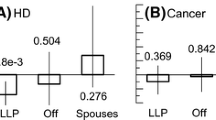Abstract
Myocardial infarction (MI), one of the most common manifestations of cardiovascular system aging, is often fatal. The vast majority of studies on genetic susceptibility to age-dependent diseases are carried out using the case–control study design. However, its use involves a number of difficulties, most of which arise when establishing the control group of relatively healthy individuals. In this work, survival functions were analyzed for carriers of alternative polymorphic variants of 18 genes that had been tested for association with MI using the case–control approach in our previous study, and the magnitude of the shift in the age of the disease onset depending on individual variations of the genome was estimated. The following risk variants were associated with the age of MI: rs2430561*A of IFNG (HR = 1.3, P = 0.043), rs1799889*5 of PAI-1 (HR = 1.3, P = 0.039), rs1800896*GG of IL10 (HR = 1.5, P = 0.0048), rs1800471*C of TGFB1 (HR = 1.5, P = 0.043), and rs11614913*TT of MIR196A2 (HR = 1.5, P = 0.035). In carriers of these variants, the disease developed 3‒6 years earlier than in carriers of alternative variants. The results of this study were compared with data on the associations with MI previously obtained on the same sample using the case–control approach. It turned out that the estimates based on the two methods mostly disagreed. However, the age-dependent approach relies on fewer assumptions that can be additionally verified. In our opinion, it makes this approach more promising than the case–control design.

Similar content being viewed by others
REFERENCES
Roberts R. 2014. Genetics of coronary artery disease. Circ. Res.114 (12), 1890–1903.
Wu M.-Y., Li C.-J., Hou M.-F., Chu P.-Y. 2017. New insights into the role of inflammation in the pathogenesis of atherosclerosis. Int. J. Mol. Sci.18 (10), pii: E2034.
Head T., Daunert S., Goldschmidt-Clermont P.J. 2017. The aging risk and atherosclerosis: A fresh look at arterial homeostasis. Front. Genet.8, 216.
King R.A., Rotter J.I., Motulsky A.G. (Eds.) 2002. The Genetic Basis of Common Diseases,vol. 44, Oxford: Oxford University Press.
Hartiala J., Schwartzman W.S., Gabbay J., Ghazalpour A., Bennett B.J., Allayee H. 2017. The genetic architecture of coronary artery disease: Current knowledge and future opportunities. Curr. Atheroscler. Rep.19 (2), 6.
Marian A.J. 2012. The enigma of genetics etiology of atherosclerosis in the post-GWAS era. Curr. Atheroscler. Rep. 14 (4), 295–299.
Tenny S., Hoffman M.R. 2020. Case Control Studies. StatPearls [Internet]. Treasure Island (FL): StatPearls Publ.
Kleinbaum D.G., Klein M. 2010. Survival Analysis,vol 3. Springer.
Slagboom P.E., van den Berg N., Deelen J. 2018. Phenome and genome based studies into human ageing and longevity: an overview. Biochim. Biophys. Acta: Mol. Basis Dis.1864 (9), 2742–2751.
Barsova R.M., Lvovs D., Titov B.V., Matveeva N.A., Shakhnovich R.M., Sukhinina T.S., Kukava N.G., Ruda M.Ya., Karamova I.M., Nasibullin T.R., Mustafina O.E., Osmak G.J., Tsareva E.Yu., Kulakova O.G., Favorov A.V., Favorova O.O. 2015. Variants of the coagulation and inflammation genes are replicably associated with myocardial infarction and epistatically interact in Russians. PLoS One. 10 (12), e0144190. https://doi.org/10.1371/journal.pone.0144190
Osmak G.Zh., Matveeva N.A., Titov B.V., Favorova O.O. 2018. The myocardial infarction associated variant in the MIR196A2 gene and presumable signaling pathways to involve miR-196a2 in the pathological phenotype. Mol. Biol. (Moscow). 52(6), 872–877.
Tibshirani R. 1996. Regression shrinkage and selection via the lasso. J. R. Stat. Soc. Ser. B: Methodol.58 (1), 267–288.
Beaglehole R., Bonita R., Kjellström T. 1993. Basic Epidemiology. Geneva: World Health Organization.
Rodrigues L., Kirkwood B.R. 1990. Case-control designs in the study of common diseases: updates on the demise of the rare disease assumption and the choice of sampling scheme for controls. Int. J. Epidemiol.19 (1), 205–213.
Conroy R.M., Pyörälä K., Fitzgerald A.P., Sans S., Menotti A., Backer G.D., Bacquer D.D., Ducimetière P., Jousilahti P., Keil U., Njølstad I., Oganov R.G., Thomsen T., Tunstall-Pedoe H., Tverdal A., et al. 2003. Estimation of ten-year risk of fatal cardiovascular disease in Europe: the SCORE project. Eur. Heart J.24 (11), 987–1003.
Wilson P.W., D’Agostino R.B., Levy D., Belanger A.M., Silbershatz H., Kannel W.B. 1998. Prediction of coronary heart disease using risk factor categories. Circulation. 97 (18), 1837–1847.
Goff D.C., Lloyd-Jones D.M., Bennett G., Coady S., D’Agostino R.B., Gibbons R., Greenland P., Lackland D.T., Levy D., O’Donnell C.J. 2014. 2013 ACC/AHA guideline on the assessment of cardiovascular risk: A report of the American College of Cardiology/American Heart Association Task Force on Practice Guidelines. Part B. J. Am. Coll. Cardiol.63 (25), 2935–2959.
Funding
This work was supported by the Russian Foundation for Basic Research, grant no. 19-315-80019.
Author information
Authors and Affiliations
Corresponding author
Ethics declarations
Conflict of interests. The authors declare that they have no conflict of interest.
Statement on the welfare of animals. This article does not contain any studies involving animals or human participants performed by any of the authors.
Additional information
Translated by D. Timchenko
Abbreviations: CHD, coronary heart disease; MI, myocardial infarction; HR, hazard ratio; OR, odds ratio; 95% CI, 95% confidence interval.
Rights and permissions
About this article
Cite this article
Osmak, G.J., Sidko, A.R., Kiselev, I.S. et al. Age-Dependent Approach to Search for Genetic Variants Associated with Myocardial Infarction. Mol Biol 54, 618–622 (2020). https://doi.org/10.1134/S0026893320040123
Received:
Revised:
Accepted:
Published:
Issue Date:
DOI: https://doi.org/10.1134/S0026893320040123




